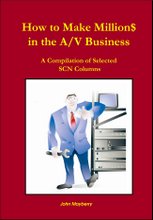Did Stub Equity Sink Harman's Deal?
By Tom Taulli September 26, 2007 Motley Fool
Certain financial trends seem to resurrect themselves every so often -- but stub equity doesn't seem to be one of them. I guess sometimes, things get buried for a reason.
Stub equity, developed in the 1980s by private equity firm Kohlberg Kravis Roberts, was all set for its big comeback in KKR and Goldman Sachs' Capital Partners' (NYSE: GS) proposed $8 billion buyout of Harman International Industries (NYSE: HAR) this past April.
With stub equity, private investors offer shareholders the option to roll their publicly traded equity into the transaction, maintaining a stake in the company in question even after it goes private. In this case, KKR and Harman hailed the deal's use of stub equity as an opportunity for investors to get the "future upside" they usually miss once a company goes private. As of late last week, however, KKR and GS Capital Partners backed out of the Harman deal, landing stub equity right back in the graveyard.
On its face, the Harman stub equity deal sounded like a good idea. But as I outlined in a previous Fool piece, shareholders risked not getting the same rights as the private equity firms. In addition, the private firm's low liquidity might have made it very difficult for investors to sell their shares.
Stub equity can also be an administrative nightmare for dealmakers. Because it involves an exchange of shares, the private equity firms must file a complicated, time-consuming S-4 form. And since smaller shareholders can participate in such transactions, they're more likely to draw increased SEC scrutiny.
Credit concerns abound right now; banks such as Bear Sterns (NYSE: BSC) have dried up liquidity, and firms with pending buyouts are experiencing buyer's remorse. But in Harman's case, it's a good bet that stub equity was a key reason for KKR and GS Capital Partners' walkout. (Admittedly, it doesn't help that KKR has several other megabuyouts pending, and is trying to assemble leverage for each of them.) I give the two companies credit for trying to revive the idea, but in the end, I think stub equity may just remain a nice theory.
About This Blog:
Integrating complex electronic projects requires industry individuals keep abreast of the latest technological trends.
Some things are important, many ironic, others outright frauds, and a few are just so very wrong. Occasionally the original technological goal and downstream results are in hilarious conflict.
Usually "the latest trends" go back fifty to one hundred years in their development and are only new to the uninformed. In most every case, the ancients have truly stolen our inventions!
As far as we know, this is the only place that collects them and lets you celebrate them for yourself. We'd love to hear from you if you have something we've missed!
Some things are important, many ironic, others outright frauds, and a few are just so very wrong. Occasionally the original technological goal and downstream results are in hilarious conflict.
Usually "the latest trends" go back fifty to one hundred years in their development and are only new to the uninformed. In most every case, the ancients have truly stolen our inventions!
As far as we know, this is the only place that collects them and lets you celebrate them for yourself. We'd love to hear from you if you have something we've missed!
Blog Archive
-
▼
2007
(294)
-
▼
September
(32)
- If You Are Drowning In Remote Controls, Harmony is...
- Battery Woes for Toyota
- Huge News- Windows XP
- Chicago Video Surveillance Gets Smarter
- Report: Blu-ray Must Drop Prices or Disappear
- Making Sense of the Harman Debacle
- Really Bad Statistics Joke
- Tough Day for Harman
- KKR, Goldman Cancel $8 Billion Harman Deal
- 80 Years Ago Today
- CBS Buys into Digital Signage
- Judge Sentences Noise Violators to Listen to Manilow
- Antipiracy Group Suffer Email Leak
- Amazing Civil War Relic
- End of an Era for Altec Lansing Professional
- iPod Development
- Are Technology Limits in MP3s and iPods Ruining Po...
- Spanish Language Broadcasts, White Space, and the FCC
- Better than YouTube Video!
- Lightning Strike on an Airplane
- Comprehending a Phone Message
- Music Found in Ceiling Carvings?
- Britney Spears Explains Semiconductor Theory
- New and Improved
- Pavarotti Dies at 71
- Motorola Off the Hook for $3.7 Billion
- Short But Sweet
- Funny Story
- The Ultimate Question
- A Single Atom?
- Mixed Messages from Sony Again
- Cheaper Than Going Home
-
▼
September
(32)


